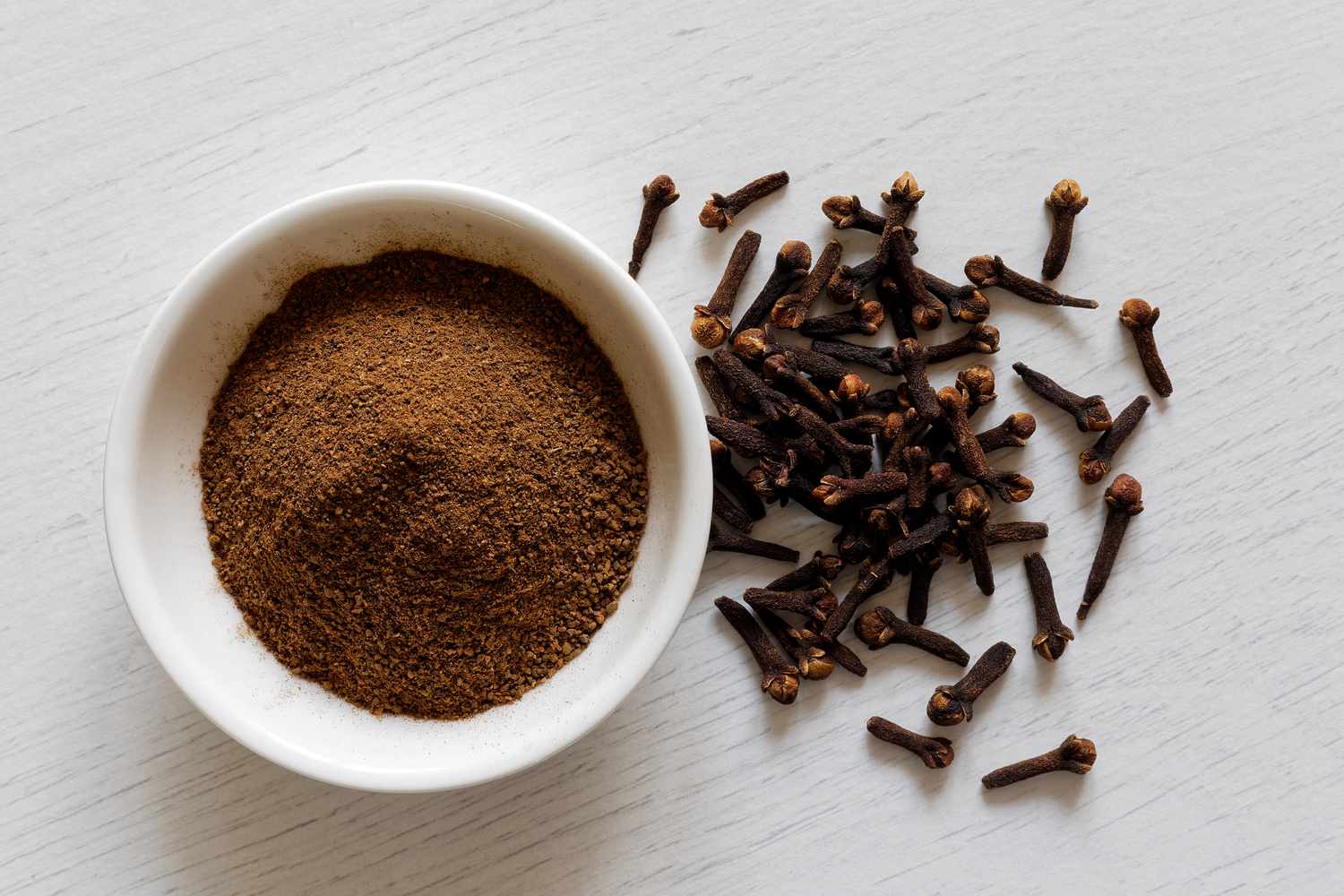Ground cloves, with their warm, sweet, and subtly spicy flavor, have graced kitchens and wellness practices for centuries. This comprehensive guide unlocks the secrets of this versatile spice, exploring its origins, culinary applications, potential health benefits, and more. By the end, you’ll be equipped to incorporate ground cloves into your everyday life, enhancing both your meals and potentially your well-being.
Discovering the Warmth of Ground Cloves
Ground cloves, recognized for their rich, inviting aroma, are derived from the dried flower buds of the clove tree (Syzygium aromaticum), an evergreen native to the Maluku Islands (historically known as the Spice Islands). These small brown buds hold a surprising depth of flavor and a captivating history.
From Tropical Bud to Culinary Spice
Clove trees flourish in tropical climates, producing small, unopened flower buds. These buds are harvested and dried, transforming into the cloves we recognize. Grinding these dried cloves releases their potent aroma and flavor, creating the ground cloves used in countless cuisines. This journey, from vibrant bud to fragrant powder, unlocks a world of culinary possibilities.
Culinary Adventures with Ground Cloves
Ground cloves are a versatile spice, enhancing both sweet and savory dishes. A pinch can transform a simple meal into something extraordinary.
Savory Sensations
Ground cloves add comforting warmth and depth to savory creations. Consider:
- Marinades: Ground cloves infuse meats like pork and lamb with rich, complex flavors. Their pungent notes penetrate the meat, creating a truly tantalizing experience.
- Stews and Curries: A dash of ground cloves adds a layer of warmth and complexity to hearty stews, fragrant curries, and even lentil soup. The unique flavor profile blends harmoniously with other spices.
- Tofu and Legumes: Ground cloves surprisingly complement vegetarian and vegan dishes, enhancing the savory notes of tofu, lentils, and other legumes.
- Vegetable Dishes: Roasted root vegetables, like carrots and sweet potatoes, take on a new dimension of flavor when seasoned with ground cloves.
- Sauces: A touch of ground cloves can add depth and warmth to a variety of sauces, from tomato-based pasta sauces to rich, creamy gravies.
If you’re seeking a bold, peppery addition to your savory dishes, consider exploring our guide on ground black peppercorns.
Sweet Indulgences
Ground cloves contribute a cozy, almost festive touch to sweet treats.
- Baking: Ground cloves are essential in classic recipes like pumpkin pie, gingerbread cookies, and apple crisp. Their warmth enhances the sweetness of these treats.
- Desserts: From apple pies to gingerbread cookies, ground cloves amplify the festive flavors of holiday desserts.
- Beverages: A dash of ground cloves adds a comforting warmth to hot beverages like mulled wine, chai tea, warm cider, hot chocolate, and even morning coffee.
- Fruit Compotes: Ground cloves lend an intriguing sweetness and festive aroma to fruit compotes, especially those featuring pears, apples, or cranberries.
Ground Cloves in Spice Blends
Ground cloves often feature in spice blends, contributing depth and complexity. Their presence enhances the overall flavor profile of:
- Garam Masala: This Indian spice blend often includes ground cloves, adding warmth and a hint of sweetness.
- Ras el Hanout: This North African spice mix can contain ground cloves, contributing to its complex, aromatic profile.
- Chinese Five-Spice: Ground cloves sometimes appear in this blend, adding a layer of warmth and depth.
- Pumpkin Pie Spice: This pre-made blend often includes ground cloves, further enhancing the autumnal flavor.
Potential Health Perks of Ground Cloves
Beyond their culinary appeal, ground cloves may offer potential health benefits. While more research is needed to fully understand these benefits, early findings suggest several promising possibilities:
Rich in Nutrients
Cloves are a good source of fiber, vitamins (A, C, E, and K), and minerals, particularly manganese. As registered dietitian nutritionist Maria Arienti notes, “For a spice, cloves have an impressive amount of fiber.” This fiber content can aid digestion and promote regularity. The manganese in cloves might contribute to blood sugar regulation.
Antioxidant Properties
Ground cloves contain antioxidants which may help protect the body from cellular damage caused by free radicals. These antioxidants may contribute to a reduced risk of chronic diseases and cancer.
Anti-inflammatory and Antibacterial Potential
Eugenol, the primary phenolic compound in clove oil, is likely responsible for many of cloves’ purported health benefits. Some research suggests that eugenol possesses anti-inflammatory and antibacterial properties, which may contribute to better digestion, oral health, and could potentially play a role in fighting off infections.
Other Potential Benefits
Ongoing research is exploring the potential of cloves to support liver health, bone health, and respiratory health. They’ve also been traditionally used to alleviate nausea, stomach ulcers, and mild pain. However, more robust scientific studies are needed to confirm these potential benefits.
Practical Uses and Tips for Ground Cloves
Ready to incorporate ground cloves into your culinary repertoire? Here are some helpful tips:
Freshly Ground is Best
For the most potent flavor and aroma, grind whole cloves just before using. Pre-ground cloves tend to lose their intensity over time. A small spice grinder or mortar and pestle works perfectly for grinding whole cloves.
Less is More
Ground cloves have a strong flavor, so start with a small amount (⅛ to ¼ teaspoon) and add more as needed. It’s easier to add than to take away!
Storage
Store ground cloves in an airtight container in a cool, dark, and dry place to preserve their flavor and aroma. Whole cloves maintain their potency longer than ground cloves.
Explore and Experiment
Don’t be afraid to experiment with ground cloves in different cuisines and dishes. From Indian curries to Moroccan tagines, the possibilities are endless. Discover your own unique ways to incorporate this versatile spice into your cooking.
Forms of Cloves: A Quick Overview
While this guide focuses on ground cloves, it’s helpful to be aware of other forms:
- Whole Cloves: Offer an intense, long-lasting flavor. Used in pickling, stews, hot beverages, and for studding meats and fruits.
- Clove Oil: Used in aromatherapy, dental applications, and some traditional remedies. Should be diluted before topical application.
- Clove Supplements: Available in concentrated form. Consult with a healthcare professional before using clove supplements.
Ground Cloves vs. Whole Cloves
While both offer the characteristic clove flavor, there are some key differences:
- Flavor Intensity: Whole cloves release their flavor more slowly during cooking, resulting in a more subtle, nuanced flavor. Ground cloves provide a more immediate, intense burst of flavor.
- Texture: Whole cloves can be removed from a dish before serving, while ground cloves blend seamlessly into the food.
- Shelf Life: Whole cloves retain their potency longer than ground cloves.
What Spice is Similar to Ground Cloves?
If you find yourself without ground cloves, several substitutes can offer a similar warmth and depth, though the flavor profile won’t be identical.
- Allspice: Often considered the closest substitute, allspice boasts a warm, sweet, and slightly peppery flavor reminiscent of cinnamon, nutmeg, and cloves. Use an equal amount of allspice as you would ground cloves.
- Cinnamon and Nutmeg: This combination provides a good approximation of clove flavor. Cinnamon brings warmth, while nutmeg adds a touch of sweetness and nuttiness. Use half the amount of each compared to the amount of cloves required.
- Pumpkin Pie Spice: This blend typically includes cinnamon, nutmeg, ginger, and sometimes cloves and allspice, making it a convenient substitute, especially in baking. Use the same amount as you would ground cloves.
- Cardamom: Offers a warm, citrusy, and herbal flavor. A less perfect substitute, but can add an interesting dimension to dishes. Use slightly less cardamom than cloves.
- Mace: A spice derived from the same plant as nutmeg, mace possesses a similar warm, slightly peppery flavor profile that can work as a clove substitute.
- Ginger: While more pungent than cloves, ginger can be a suitable replacement in savory dishes and marinades where a spicy kick is desired.
- Sweet Paprika: While milder than cloves, sweet paprika offers a warm, earthy flavor and adds a vibrant color to dishes.
Remember, flavor is subjective! When substituting, start with a smaller amount and adjust to taste.
If you’re looking for an alternative oil in your cooking and happen to be out of grapeseed oil, our guide on grapeseed oil substitutes can offer some helpful options.
What are the Benefits of Clove Spice?
Cloves, in both whole and ground forms, offer a wealth of potential health benefits due to their rich nutritional profile and the presence of eugenol, a powerful phenolic compound.
- Digestive Support: The high fiber content in cloves can promote healthy digestion and regularity.
- Blood Sugar Management: Cloves may contribute to maintaining healthy blood sugar levels.
- Anti-inflammatory Effects: Eugenol’s anti-inflammatory properties could potentially help reduce inflammation in the body.
- Antibacterial Action: Cloves have demonstrated antibacterial activity against various strains of bacteria.
- Antioxidant Protection: The antioxidants in cloves may help protect cells from damage caused by free radicals.
- Oral Health: Traditionally used for toothaches, cloves’ analgesic and antibacterial properties can offer temporary relief from oral pain.
It’s important to note that while cloves show promise in supporting various aspects of health, more research is needed to definitively confirm these benefits. If you’re considering using cloves for medicinal purposes, consult a qualified healthcare professional for personalized advice.
Conclusion: Embracing the Versatility of Ground Cloves
Ground cloves are more than just a spice; they’re a culinary treasure and a potential wellness booster. From enhancing the flavor of savory dishes and sweet treats to possibly offering various health benefits, ground cloves deserve a prominent place in your kitchen and wellness routine. Explore the myriad ways to incorporate this versatile spice into your daily life and discover its remarkable potential.
- Stainless Steel Containers Offer Superior Food Preservation and Durability - February 25, 2026
- Stainless Steel Food Storage Containers Elevate Daily Meal Prep - February 24, 2026
- Stainless Steel Food Containers Offer Safe, Sustainable Meal Storage - February 23, 2026










